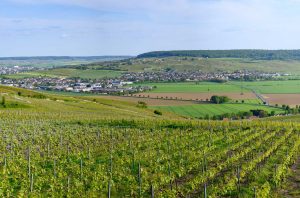Vineyard scene in the Marne Valley.
Authorities found hungry, exhausted workers living in a squalid hut when conducting a routine check in Nesle-le-Repons, a village in the Marne Valley.
Gendarmes and officers from France’s MSA agency regularly inspect these buildings in a bid to combat illegal work.
They discovered ‘makeshift bedding, dilapidation, unsanitary conditions, lack of cleaning and disinfection, the disgusting state of toilets, sanitary facilities and common areas [and] the accumulation of faecal matter in the sanitary facilities’, according to a report from the prefectural decree.
Officials also noted non-compliant electrical applications, which posed a risk to the 52 undocumented workers, who were from Senegal, Mali, Mauritania, Guinea and Gambia.
One of the Champagne pickers shared video footage of the accommodation with French media outlets, showing a mud floor, grimy beds and no ceiling.
They told reporters that they were recruited in Paris and promised €80 per day to pick Champagne grapes, but the funds were not forthcoming. The workers said they were only given a bag of rice and a few bunches of grapes to eat.
‘We were hot during the day and cold at night,’ said one worker, Mahamadou, who came from Mali to France to pick grapes, in an interview with l’Humanité. ‘We didn’t eat much, like dogs, we slept [penned in] like sheep, we washed with cold water. We were treated like slaves. The toilets were clogged, it smelled very bad. We really suffered.’
Sabine Duménil, general secretary of the local trade union in Marne, went to meet the seasonal workers after hearing the news.
‘They were mistreated in every way,’ she told Journal L’Union. ‘Some of them suffer from respiratory problems. There was no roof, showers or blankets.’
The Salvation Army rehoused them in hotels located in Châlons-en-Champagne and Reims.
‘These seasonal workers have not received the promised remuneration,’ added Duménil, who hopes to accompany them to an industrial tribunal.
Reports in France have alleged that the premises were owned by a Paris-based company called Anavim, a service provider that specialises in vineyard work.
However, Céline Fassey, vice-prosecutor of Châlons-en-Champagne, told AFP that ‘several companies’ are being targeted in their investigations.
She added that they were not linked to the four grape pickers that died of suspected heatstroke during this year’s Champagne harvest.
Fassey did not disclose which Champagne producer’s vineyards these undocumented migrants were working at.
Around 120,000 seasonal workers generally help out with the two-week annual Champagne harvest. Growers in the region – where machine harvesting is prohibited – typically recruit grape pickers through specialist agencies.
José Blanco, the general secretary for the CGT trade union in the Champagne region, railed against the ‘omerta’ in the ‘world of Champagne’.
‘Everyone turns a blind eye because it’s the most expensive grape in the world,’ he told AFP.
There have been several human trafficking scandals in the region over the past few years. Last summer, Chandrika Thangarajah and Pathmaja Suntharalingam – founders of a wine service company called Rajviti – were found guilty of ‘trafficking in human beings’ and sentenced to three years in prison after housing undocumented migrants in unsanitary conditions in Marne.
Earlier this month, French authorities also found 18 Bulgarian grape pickers housed in potentially hazardous conditions in Cuis, near Epernay.
In a separate case, around 150 Ukrainian grape pickers were found in an unsanitary and dangerous building in Mourmelon-le-Petit in the Marne Valley in September. Officials ordered its closure and put the owner on notice.
The post Human trafficking investigations launched in the Champagne region appeared first on Decanter.
